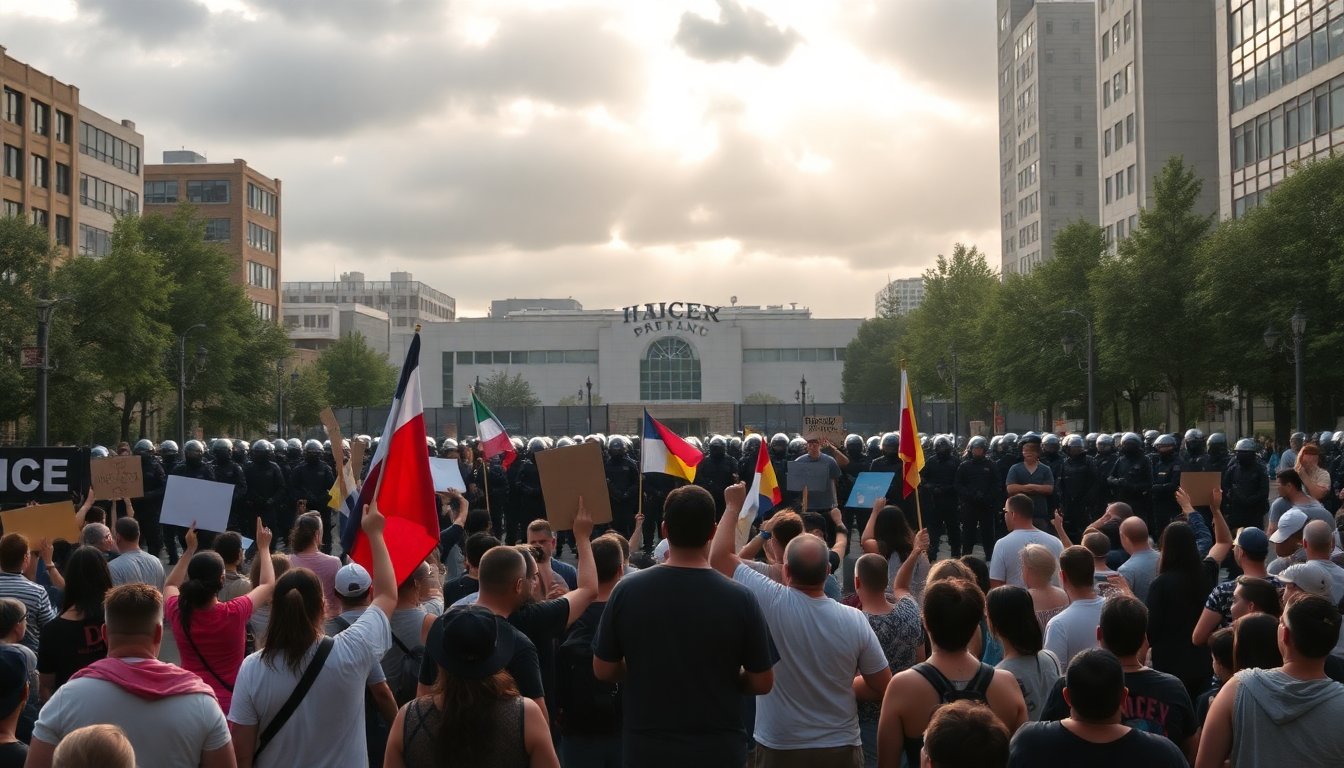Table of Contents
The protests near the Immigration and Customs Enforcement (ICE) facility in Portland, Oregon, have ignited a significant discussion regarding the militarization of domestic law enforcement. As tensions rise, some commentators are drawing parallels to authoritarian regimes worldwide. This situation not only highlights the unrest in Portland but also reflects a troubling trend that could have broader implications for democracy in the United States.
Amy La Porte, a former CNN journalist, described Portland in an opinion piece as a disturbing pilot program for the normalization of domestic militarization. She notes how the city, once celebrated for its vibrant culture and community spirit, is now under the watchful eyes of helicopters and armored vehicles. The protests, which have persisted for over a hundred nights, have transformed Portland into what some perceive as a battleground, echoing a metaphorical war that feels increasingly tangible and threatening.
Responses from federal authorities
In late September, President Donald Trump announced plans to send military support to Portland, labeling it a war-ravaged zone in need of protection from so-called domestic terrorists like Antifa. His directive to Secretary of War Pete Hegseth to deploy troops raised concerns and drew criticism. Shortly after, a federal judge intervened, blocking the deployment of National Guard troops, which illuminated the complex legal and ethical landscape surrounding the use of force against protesters.
Historical comparisons
La Porte’s commentary draws unsettling comparisons between the United States and authoritarian leaders such as Russia’s Vladimir Putin, Turkey’s Recep Tayyip Erdogan, and Brazil’s Jair Bolsonaro. She argues that Trump’s approach mirrors tactics used by these leaders to consolidate power and suppress dissent. The notion of using military force against civilians raises serious questions about the integrity and strength of American institutions.
Furthermore, La Porte emphasizes that while some may believe the United States’ democratic foundations are too robust to falter, history tells a different story. She cites examples like Hungary’s Viktor Orban and Venezuela’s Hugo Chávez, who effectively dismantled democratic frameworks within years, leading to increased authoritarianism.
Impacts on media and society
The implications of these events extend beyond the streets of Portland. La Porte mentions the recent suspension of late-night host Jimmy Kimmel as an example of the increasingly precarious environment for free speech. His brief hiatus after controversial remarks about a shooting incident raises alarms about censorship and the potential consequences of speaking out against prevailing narratives.
As a journalist, La Porte has learned to be vigilant. She keeps her passport accessible and her writing tools ready, aware that the history of authoritarianism often leaves little room for those who oppose it. She warns that the erosion of democracy is not a sudden plunge but a gradual descent, like a staircase where each step may feel manageable until the ground suddenly vanishes.
A fragile existence
Despite these alarming developments, La Porte notes that life in Portland retains its ordinary charm. However, this normalcy feels precarious, overshadowed by an impending storm. The protests, while initially peaceful, have escalated into more violent confrontations, with reports of projectiles thrown at the ICE facility and aggressive clashes with law enforcement.
Camila Wamsley, director of the Portland ICE office, has described the chaotic atmosphere, emphasizing the frustration felt by authorities who are unable to intervene decisively due to legal limitations. Each night, protesters engage in activities that have grown increasingly confrontational, blurring the lines between peaceful demonstration and outright violence.
A call to action
La Porte urges citizens to recognize the gravity of the situation. She warns that if this pattern continues, cities like Seattle and Atlanta could face similar federal interventions. Each encroachment by federal forces widens the cracks in the foundation of democracy, and it is crucial for the public to respond collectively. She advocates for peaceful but assertive resistance, whether through online platforms, courtrooms, or on the streets, insisting that a true republic cannot tolerate authoritarianism.
Amy La Porte, a former CNN journalist, described Portland in an opinion piece as a disturbing pilot program for the normalization of domestic militarization. She notes how the city, once celebrated for its vibrant culture and community spirit, is now under the watchful eyes of helicopters and armored vehicles. The protests, which have persisted for over a hundred nights, have transformed Portland into what some perceive as a battleground, echoing a metaphorical war that feels increasingly tangible and threatening.0


